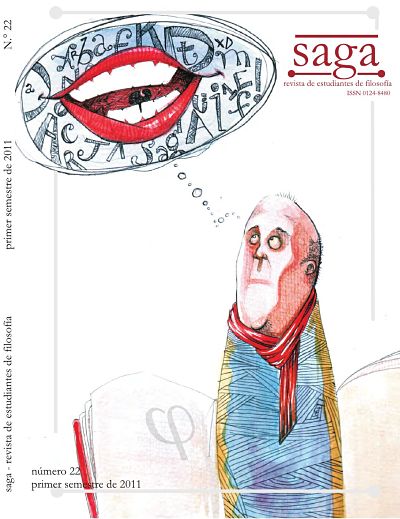Pensamientos Demostrativosivos y Relaciones Causales
Demonstrative Thougths and Causal Relations
Palabras clave:
Evans, Burge, Campbell, Experiencia perceptual, Pensamientos demostrativos, Semántica (es)Evans, Burge, Campbell, Perceptual experience, Demonstrative thoughts, Causal relations (en)
Descargas
I am interested in researching how it is that our demonstrative thoughts dependent on perceptual experience are about material objects? What is, and how is the relationship between a mental state and a material object, when the first is about the second? That is, how it is that a demonstrative thought relates to a material object? How do our demonstrative thoughts about the material world refer to the material world? I think there are two very general answers to this question and each of those ways depends on our own version of the mind. On the one hand, there is a Fregean version of the mind, according to which there are modes of presentation which outline the mind’s shape and determine the objects which the mind thinks about. There is another, more scientific, version of the mind which I call non-Fregean, according to which there are no modes of presentation that determine the objects about which the mind thinks, but rather there are causal relationships (perhaps evolutionarily developed) between kinds of things and kinds of mental states that effectively determine which objects the mind has thoughts about. I want to show why I think the non-Fregean treatment of the question does not give a satisfactory explanation of how it is possible that a mind can have true thoughts. My objections have to do with the way they conceive the connection between mind and the world, in order to make thought possible.
Referencias
Aydede, M. “Fodor on Concepts and Frege Puzzles”. Pacific Philosophical Quarterly 79/4 (2003): 289-294.
Aydede, M. “Demonstrative Construction, Reference and Truth”. The Journal of Philosophy 71/7 (Apr. 18 1974): 205-223.
Aydede, M. “Belief De Re”, The Journal of Philosophy, 74/6 (Jun. 1977): 338-362.
Aydede, M. “The content of propositional attitudes”. Noûs, 14/1 (1980): 53-58.
Campbell, J. Knowledge and the Flow of Information. Cambridge, Mass: MIT Press, 1981.
Campbell, J. Reference and Consciousness. Oxford: Oxford University Press, 2002.
Campbell, J. “Consciousness and Reference”. Oxford Handbook of Philosophy of Mind. Oxford: Oxford University Press, 2009. 648-662.
Evans, G. Varieties of Reference. Oxford: Oxford Univesity Press, 1982.
Fodor, J. LOT 2: Language of Thought revisited. Oxford: Oxford University Press, 2008.
Haugeland, J. Having Thought: Essays in the Metaphysics of Mind. Cambridge/MA & London: Harvard Univesity Press, 1998.
Kaplan, D. “Demonstratives”. Themes from Kaplan. New York: Oxford University Press, 1989.
McDowell, J. “De Re Senses”. Meaning, Knowledge and Reality. Cambridge, Mass: Harvard University Press, 1998.
Peacocke, C. A theory of concepts. Cambridge: MIT Press, 1992.
Segal, G. “The return of the individual”, Mind XCVIII (1989): 39-57.
Cómo citar
APA
ACM
ACS
ABNT
Chicago
Harvard
IEEE
MLA
Turabian
Vancouver
Descargar cita
Visitas a la página del resumen del artículo
Descargas
Licencia
Derechos de autor 2022 Saga – Revista de Estudiantes de Filosofía

Esta obra está bajo una licencia internacional Creative Commons Atribución-NoComercial-SinDerivadas 4.0.
Todos los documentos alojados en esta web están protegidos por la licencia CC attribution non commercial no derivatives 4.0 intenational

















